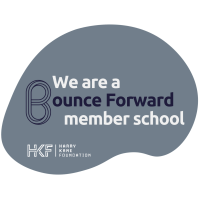We are delighted to announce that Manor School has been selected as one of 17 schools across England to benefit from a wellbeing initiative supported by the Harry Kane Foundation.
To mark its one-year anniversary, the Harry Kane Foundation - which aims to change the way people think about mental health - has announced a new partnership with Bounce Forward, a renowned charity that supports children and the adults around them to build resilience and emotional wellbeing.
The partnership will provide free psychological fitness training and educational resources, designed to nurture and build mental resilience, and emotional wellbeing and proven to have positive impact. These resources will be available in schools, workplaces, and to a broader audience through Harry’s influence, platforms, and networks, with the goal of promoting positive mental health across all generations.
To kick things off, the 17 selected schools are benefiting from the Harry Kane Foundation’s support by being set up with the high-quality Healthy Minds teaching resources that feature bespoke content co-authored by Harry and his wife, Kate.
We are launching the initiative this November, with students across all year groups participating in sessions on the core fundamentals of developing resilience. Later in the year students will benefit from important new lessons inspired by Harry by learning about the role that exercise, nutrition and sleep has on mental health.
We are delighted that Manor School has been selected as one of the schools to be part of this incredible pilot. Resilience is the linchpin of our school REACH values and one we know many students need support to develop. As the great Brené Brown says, ‘Joy, collected over time, fuels resilience – ensuring we’ll have reservoirs of emotional strength when bad things happen’. To teach the gift of mental resilience to our children and young people is a privilege and essential if we are to prepare them for life.
Amy Bradshaw, Mental Health Lead for the Nene Education Trust, said: “I am excited to get these teaching resources to students. Learning how to be calm and focused has never been more important. I have enjoyed helping to develop these new lessons with Kate and others, and look forward to sharing how they are received by students over the next year.”
To date, Bounce Forward has amassed over 175 member schools, reached 14,000+ parents, and is working with the Harry Kane Foundation with ambition to enable every primary and secondary school in the country to access its resources entirely free of charge and for it to embed into the core curriculum for long term impact.
Harry Kane said: “I’m proud of the work my foundation has achieved over the last year and am excited that we will extend our reach and impact through a new partnership with Bounce Forward. We are supporting Bounce Forward because they are experts in their field and have developed evidence-based resources that align perfectly with our aim of promoting the benefits of positive self-belief and the connection between physical and mental health.”
Lucy Bailey, CEO at Bounce Forward, said: “Harry and Kate’s commitment to influence how we think about mental health is perfectly timed. When it comes to mental health, prevention is so much better than cure, and our psychological health is as important as physical health. It is increasingly challenging to navigate our changing and complex world. For adults it is hard, for children it is even harder. We need to teach our children, as part of their core education, and there is no better way than with Healthy Minds. Teaching our children about the brain, the role of positive emotions and the value of optimism and human connection is vital learning for the world we live in. We need to help young people not only to deal well with the setbacks they will inevitably face throughout life, but also equip them to embrace opportunities around them. Its impressive evidence base includes improving attendance, which is of growing concern for schools reducing fixed term exclusions as well as improving health and wellbeing outcomes.”




